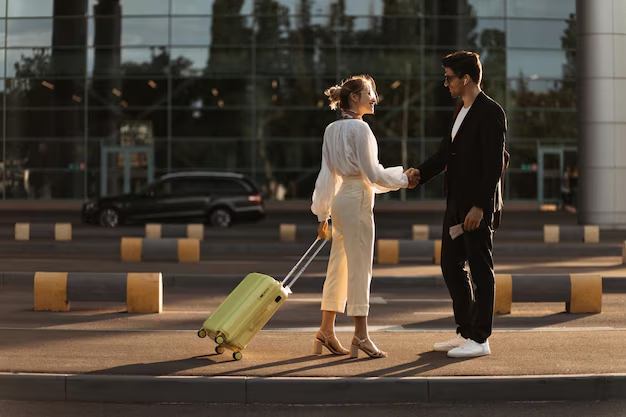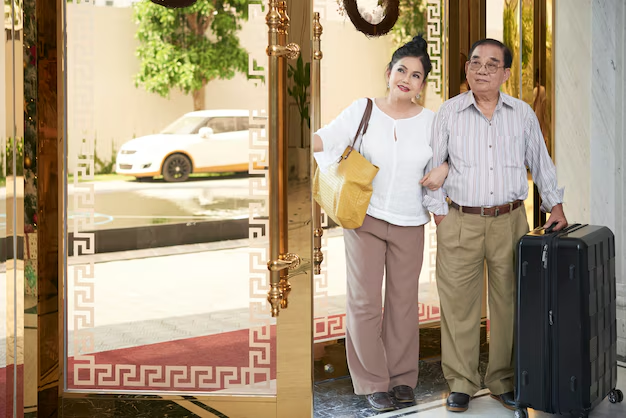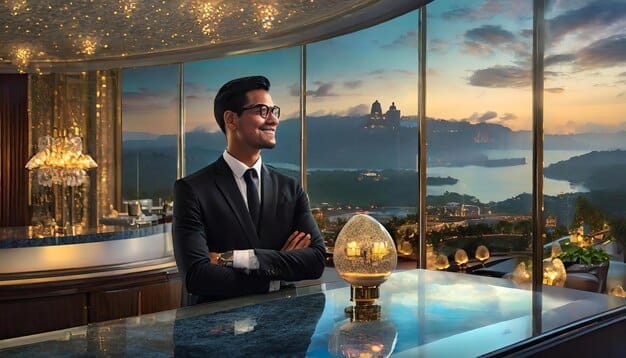In recent years, the tourism industry has witnessed a dramatic shift in the way people approach travel. As global wealth has increased, so has the demand for exclusive, high-end travel experiences. This growing segment of affluent individuals is often referred to as “luxury travelers.” But what defines a luxury traveler? More importantly, what are their expectations when it comes to travel?
Luxury travel is often viewed as the epitome of opulence, extravagance, and unparalleled experiences. However, luxury travel extends far beyond plush accommodations, private jets, and five-star services. It is a multifaceted concept, driven by exclusivity, personalization, and the ability to cater to the specific desires of each individual traveler. In this article, we will explore the defining characteristics of luxury travelers and delve into their expectations, highlighting the ever-evolving nature of this travel niche.
Key Takeaways
- Luxury Traveler Definition: Luxury travelers are affluent individuals who seek personalized, exclusive, and high-end travel experiences.
- Key Expectations: They expect seamless, hassle-free journeys, superior customer service, personalized experiences, and access to exclusive destinations and activities.
- Desire for Authenticity: While luxury is important, luxury travelers also value authenticity and cultural immersion during their travels.
- Sustainability: Many luxury travelers are increasingly focused on sustainability and ethical practices in their travel choices.
- Attention to Detail: Every aspect of their experience should be carefully curated to their tastes, preferences, and desires.
Defining the Luxury Traveler

Luxury travel is synonymous with personalized experiences, lavish services, and attention to detail. However, the definition of a luxury traveler extends beyond the material aspects. A luxury traveler is typically someone who seeks an escape from the ordinary and embraces unique and exclusive experiences. These travelers don’t just book a vacation; they seek a curated experience that provides a high level of comfort, privacy, and attention.
Here are the key attributes that define a luxury traveler:
Affluence and Discretion
Luxury travelers are individuals with significant disposable income, often executives, entrepreneurs, celebrities, or wealthy retirees. They have the financial resources to choose from the most exclusive and expensive options available. However, luxury travel is not always about showing off wealth; it’s often about discretion. Luxury travelers prefer privacy and personal space, so they avoid crowded tourist destinations and opt for secluded retreats and exclusive locations.
Desire for Personalization and Exclusivity
What sets luxury travelers apart is their desire for personalized, tailor-made experiences. They do not want a one-size-fits-all package. Instead, they expect every aspect of their journey to be customized to their specific tastes, preferences, and interests. This includes bespoke itineraries, curated dining experiences, private tours, and exclusive access to events or destinations. For example, they may want to explore a city with a private guide who can tailor the tour based on their specific interests, or enjoy a gourmet meal prepared by a celebrity chef in a private setting.
Exclusivity is key, and luxury travelers want to be treated like VIPs. They expect access to experiences that are not available to the general public, such as private yacht charters, private island resorts, or personalized shopping experiences at high-end boutiques. The exclusivity of the experience is often more important than the luxury itself.
High Expectations of Service
A defining characteristic of luxury travelers is their expectation for impeccable service. From the moment they book their trip to the final farewell, luxury travelers expect outstanding customer service at every touchpoint. This includes everything from personalized greetings at airports, private concierge services, to attentive staff at their accommodations. Luxury travelers value high levels of professionalism, attention to detail, and a proactive approach to service. They expect to have their needs anticipated before they even express them.
For instance, in a luxury hotel, the concierge should not only provide information about local attractions but also anticipate needs such as restaurant reservations, private transportation, and wellness treatments. The goal is to create an effortless and seamless experience for the traveler.
Focus on Comfort and Convenience
When it comes to luxury travel, comfort is non-negotiable. Luxury travelers expect the highest levels of comfort, whether it’s in their accommodation, transportation, or activities. Accommodations should provide luxurious bedding, spacious rooms, state-of-the-art amenities, and an environment that promotes relaxation. They often prefer private villas or suites with exclusive facilities such as personal pools, spas, or private beaches.
Additionally, luxury travelers prioritize convenience. They expect ease of access to their destinations, and this often involves private jet services, chauffeured transportation, and fast-tracked services to avoid long queues or waiting times. The idea is to ensure that every aspect of the travel experience is as effortless as possible.
Curated and Authentic Experiences
While luxury travelers enjoy the comfort and opulence that comes with five-star accommodations and first-class flights, what truly elevates their experience is the opportunity to engage in curated and authentic experiences. Rather than visiting well-known tourist attractions, luxury travelers are drawn to authentic, off-the-beaten-path experiences that allow them to connect with the destination on a deeper level.
These experiences can range from private cooking classes with local chefs, bespoke wine-tasting tours, to exclusive access to cultural events or private viewings of world-famous art galleries. Luxury travelers value cultural immersion, and they seek activities that offer them an authentic understanding of the destinations they visit.
Sustainability and Ethical Practices
In recent years, the notion of sustainability has become an important consideration for luxury travelers. More affluent individuals are becoming increasingly aware of their environmental footprint and the impact of tourism on local communities. As a result, many luxury travelers now seek out eco-friendly accommodations and sustainable travel experiences that align with their values.
Whether it’s staying at a green-certified hotel, taking part in conservation projects, or supporting local artisans, luxury travelers are willing to invest in experiences that prioritize environmental and social responsibility. Ethical practices are becoming a key factor in their decision-making process.
Expectations of Luxury Travelers

With a deeper understanding of who luxury travelers are, it’s time to explore what they expect from their travel experiences. The expectations of luxury travelers are varied and extensive, but they consistently revolve around a few central themes: personalization, exclusivity, exceptional service, and a seamless experience.
Seamless Experience
Luxury travelers expect a seamless and hassle-free experience from the moment they make their booking to the moment they return home. They do not want to deal with the minutiae of travel logistics. Every detail should be taken care of, including transportation, reservations, and accommodations. Their expectation is that they can simply enjoy the experience without having to worry about anything else.
Superior Customer Service
Superior customer service is at the heart of luxury travel. Luxury travelers expect the highest levels of service at every step of their journey. This includes polite, professional, and knowledgeable staff who can anticipate their needs. Whether it’s a concierge who provides them with exclusive recommendations or a butler who attends to their every desire, service should be impeccable.
Exclusive Access
Luxury travelers want access to experiences, destinations, and accommodations that are not available to the general public. Whether it’s a private yacht cruise in the Mediterranean, a helicopter tour over the Grand Canyon, or VIP tickets to a sold-out concert, exclusivity is a key expectation.
Attention to Detail
Every detail matters to luxury travelers. From personalized welcome amenities to customized itineraries, luxury travelers expect that their preferences will be taken into account. This includes special requests such as dietary restrictions, room preferences, or particular experiences they want to pursue during their stay.
Genuine and Authentic Experiences
While luxury travelers seek comfort and luxury, they also expect authentic, meaningful experiences that help them connect with a destination’s culture, history, and people. They do not want generic or mass-market experiences but instead seek opportunities for personal growth, enrichment, and true immersion.
What Motivates Luxury Travelers?
One of the most common misconceptions about luxury travelers is that they’re motivated solely by price. Yes, price is important, but it’s not the be-all, end-all. In fact, many luxury travelers are willing to pay more for an exceptional experience that meets their specific needs and requirements.
“Luxury travelers are looking for experiences that are authentic, unique, and personal,” says Katie Dillon, editor of La Jolla Mom. “They’re not interested in cookie-cutter vacations or one-size-fits-all solutions. They want something that is tailored specifically for them.”
This sentiment was echoed by Susan Breslow Sardone, author of Romantic Weekends in New York City. “Luxury travelers want the best of everything,” she says. “They don’t want to waste their time or money on anything less than perfection.”
What Sets Luxury Travelers Apart?
So what sets luxury travelers apart from other types of travelers? For starters, they tend to be more well-educated and have higher incomes. They’re also more likely to be employed in professional or managerial positions. And although some luxury travelers are retired, a significant portion are still in their prime earning years (Millennials and GenX).
Luxury travelers also tend to be more experienced than other types of travelers. They’ve been around the world and back again and know exactly what they want—and don’t want—in a travel experience. This is why they’re often willing to pay more for something that delivers on their expectations.
Finally, luxury travelers tend to be early adopters when it comes to new trends and technologies. They’re always on the lookout for new ways to improve their travel experiences—and they’re usually the first ones to try them out.
Perception one: All luxury travelers are very wealthy

The image that luxury travel conjures is one of vacationers with millions of dollars to their names. In fact, 35 percent of the luxury-travel market is now composed of travelers with net worths of between $100,000 and $1 million.
Most Popular Insights
- Meet the moment: Navigate change with McKinsey’s best 2024 insights
- The next big arenas of competition
- 2024: The year in charts
- Author Talks: The world’s longest study of adult development finds the key to happy living
- What to read next: McKinsey’s 2024 annual book recommendations
Luxury means different things to travelers at different wealth levels. High-net-worth individuals (HNWIs), with assets ranging between $1 million and $5 million, tend to trust boutique travel agents, seek privacy and exclusivity, and favor exotic destinations. Very-high-net-worth individuals (VHNWIs), with assets ranging between $5 million and $30 million, are relatively more likely to book large suites to preserve intimacy and tranquility, prefer end-to-end experiences steeped in local ambiance, and may be less focused on hotel brand names. Ultrahigh-net-worth individuals (UHNWIs), with more than $30 million in assets, prefer quiet luxury with personalized service—targeting remote, private destinations, accessible via private airports or helipads, that feature tailored experiences available nowhere else.
Aspiring luxury travelers have their own set of preferences (Exhibit 2). They might splurge on special occasions, prefer visibly branded luxury, demand value for their money, and pay close attention to loyalty program points and benefits. They might be willing to spend big on individual components of their travel—such as a helicopter tour or fine-dining experience—but not on every aspect of a trip.
Perception two: Luxury travelers come from Europe and the United States
The geographical balance of wealth is shifting. Although North America is still home to the most millionaires, it could be overtaken by Asia by the mid-2030s—largely as a result of growing wealth in China.
The rapid growth of wealth in Asia is spurring a boom in regional hotel construction (Exhibit 3). A 2023 assessment of the global luxury-hotel pipeline found that 41 percent of hotel rooms in the pipeline are in Asia, with 43 percent of those in China. The luxury-hotel supply in Asia, both existing and in the pipeline, leans heavily toward larger properties, chains, and franchises, reflecting the industry landscape in Asia as well as a preference among Asian travelers for luxury brands they know and trust.
History of Luxury Travel
Luxury travel has a long and rich history, initially reserved for the aristocracy and nobility who took voyages to flaunt their power and wealth. Over the centuries, luxury travel and luxury hotel brands have undergone significant transformations. From grand tours across Europe during the Renaissance to glamorous transatlantic journeys on opulent ocean liners in the early 20th century, it has always been associated with excellence and the extraordinary.
This concept of luxury travel is deeply ingrained in human history, as even ancient Roman philosopher Seneca observed that “travel and change of place impart new vigor to the mind”” However, today’s notion of luxurious travel combines both continuity with the past and something refreshingly new. While still intricately linked to prestige and opulence, it now places a greater emphasis on authentic personal growth rather than mere displays of wealth. This shift can be attributed to evolving societal norms and attitudes toward travel, especially the changing psychology of luxury consumers.
Luxury Traveler Demographics
Luxury travelers are a unique group, characterized by certain distinct demographics. Though these characteristics may vary depending on regions and cultures, there are several consistent trends that define this class of globe trotters.
- Age Range: Luxury travel appeals to a wide range of age groups, not just older individuals who have had more time to accumulate wealth. It encompasses millennials in search of unique experiences and baby boomers who prioritize comfort and convenience.
- Income Levels: Luxury travelers typically have substantial financial resources to afford high-end trips without straining their budgets.
- Occupation: Having a high-paying job or running successful businesses makes it easier to afford more expensive luxuries, such as leisure travel.
- Education Level: Individuals with higher levels of education often have a greater inclination and capacity to indulge in luxury products and services, including high-end travel experiences.
Luxury Traveler Psychographics

When exploring personal traits and characteristics, psychographics provide a deeper understanding beyond basic demographics. They reveal attitudes, interests, lifestyle choices, and values that drive individuals to seek out luxurious experiences.
- Desire for Exclusivity: Many affluent travelers seek out distinctive and exclusive destinations that are off the beaten path, away from crowded tourist hotspots. These hidden gems offer a sense of prestige that appeals to their desire for a more personalized travel experience.
- The Search for Authenticity: When luxury travelers embark on a journey, they are often looking for unique and immersive experiences that can’t be replicated. The mindset of these travelers shifts from simply sightseeing to truly connecting with the local culture to facilitate memorable exchange.
- Pursuit of Wellness: Wellness-focused luxury journeys often offer a perfect combination of indulgence and rejuvenation. These experiences include pampering spa treatments, invigorating detox programs, and serene yoga retreats to help guests achieve their wellness goals while enjoying a truly relaxing getaway.
- Value for Time: Time is highly valued by luxury travelers. They prioritize vacations that are well-organized and flow perfectly, allowing them to fully enjoy their experience.
- High-risk Travel: While this is a small niche within the profile of wealthy travelers, some individuals get bored with typical vacations and want to enjoy risky travel experiences, such as booking tickets to space, or expeditions to wilderness.
Psychological Processes Behind Luxury Travel
The psychology behind luxury travel is fascinating and multi-faceted, often driven by motivations and urges that run deeper than you might initially think. Beyond satisfying natural curiosity, traveling for leisure taps into intrinsic psychological processes like the quest for individuality, signaling status through high-cost experiences, and shaping our own personal narratives.
The Need for Uniqueness
Luxury travelers have a strong desire for distinctiveness. They seek unique travel experiences that distinguish them from typical tourists. These experiences are rare and not easily accessible to most people, such as private island getaways, personalized tours curated by local experts, or stays at exclusive resorts reserved exclusively for a privileged few.
Costly Signaling and Status
The psychology of travel also relates to what biologists refer to as “costly signaling theory”. This theory suggests that people often display conspicuous consumption, such as spending large sums of money on seemingly unnecessary things, to signal their wealth and status. In the realm of luxury travel, this concept is especially relevant. Lavish vacations may serve as tangible demonstrations of financial power and social standing.
Building Self and Self-Narrative
Traveling provides us with the chance to not only explore new places but to embark on a journey of self-discovery. Immersing ourselves in different cultures and engaging in transformative experiences allows for deep introspection and reflection. Psychologists refer to this as building a “self-narrative” that shapes how we view ourselves and our experiences. Luxury travel taps into this psychological aspect by providing environments that foster personal growth and introspection.
Also Read : What Makes Luxury Travel Experiences Truly Unforgettable?
Conclusion
Luxury travelers are a unique and discerning group, whose expectations go far beyond the ordinary. They seek experiences that are exclusive, tailored to their needs, and offer unparalleled comfort, privacy, and service. For them, the essence of luxury travel lies in personalization, attention to detail, and access to experiences that cannot be found by the general public. As the demand for luxury travel continues to rise, it is essential for travel providers to understand these expectations and deliver on the promise of exceptional, once-in-a-lifetime experiences.
FAQs
What makes a traveler a luxury traveler?
A luxury traveler is typically someone with significant disposable income who seeks exclusive, personalized experiences that cater to their specific tastes and desires. They value comfort, privacy, exceptional service, and curated, authentic experiences.
What is the main expectation of luxury travelers?
Luxury travelers expect a seamless, hassle-free experience with superior customer service, exclusive access to experiences, and personalized services tailored to their preferences.
Are luxury travelers concerned with sustainability?
Yes, many luxury travelers are becoming increasingly conscious of sustainability and ethical practices. They often seek eco-friendly accommodations and experiences that align with their values.
What type of accommodations do luxury travelers prefer?
Luxury travelers prefer high-end accommodations, such as private villas, suites in five-star hotels, or boutique properties with exclusive amenities like private pools, spas, and personalized services.
How important is personalization for luxury travelers?
Personalization is a key aspect of luxury travel. Luxury travelers expect every detail of their trip to be tailored to their specific preferences, including customized itineraries, dining experiences, and activities.
What kind of experiences do luxury travelers seek?
Luxury travelers seek exclusive, curated experiences such as private yacht charters, private guided tours, cultural immersion activities, and access to VIP events.
How does customer service impact the luxury travel experience?
Exceptional customer service is crucial for luxury travelers. They expect attentive, professional staff who can anticipate their needs and provide seamless, personalized service throughout their journey.
